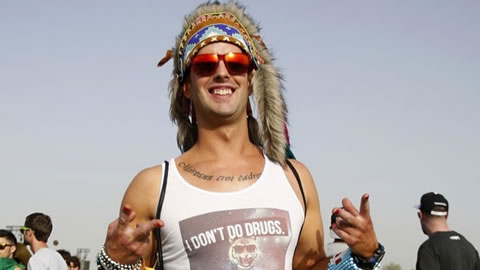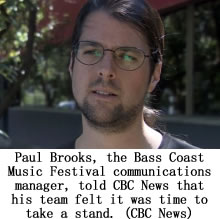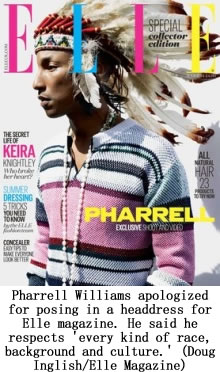 |
Canku Ota
|
 |
|
(Many Paths)
|
||
|
An Online Newsletter
Celebrating Native America
|
||
|
August 2014 - Volume
12 Number 8
|
||
|
|
||
|
Bass Coast Festival
Headdress Ban Ruffles Feathers And Sparks Debate
|
||
|
by CBC News
|
||
|
Organizers of the B.C. music festival say they're overwhelmed by the international reaction
What started as a policy decision by the Bass Coast Music and Arts Festival in Merritt, B.C., has exploded into an international discussion on cultural appropriation and a movement to stop revellers from wearing First Nation-style headdresses to parties around the world.
The feathered headdress has become a sensitive pop culture phenomenon, springing up in fashion shows, music videos and on the heads of partygoers from Coachella to Bonnaroo. But in a statement posted last week on Facebook, Bass Coast organizers explained that headdresses are unwelcome at this weekend's festival, which takes place on indigenous territory, and that security would be enforcing the ban.
Paul Brooks, the festival's communications manager, told CBC Arts reporter Zulekha Nathoo that the ban is about respect:
"There are many Indian bands in the area, many reservations, so we want to be good neighbours. We want to be respectful of aboriginal people not only in the area … but across Canada and North America." Brooks said he's received an outpouring of thanks and support for the ban, including international media attention from Buzzfeed, Jezebel, and the British online publication the Guardian. He also got a tweet of approval from Juno-award winning aboriginal DJ group A Tribe Called Red, who are headlining Bass Coast this year.
Chanel, Victoria's Secret, H&M, Urban Outfitters and Paul Frank have also come under fire for inappropriately using First Nations symbols or imagery in their fashions. Wanda Nanibush, a First Nations artist and activist in Toronto, says that if artists really want to honour First Nations people then they should find out what the symbols mean first. "The headdress is a sign of honour, so really the only way that someone like Chanel or Karl Lagerfeld? or Pharrell could actually get one legitimately would be if they did something quite amazing for our people, and they haven't done that, so they don't deserve one." The Bass Coast Music Festival takes place Aug. 1-4 at the Merritt festival grounds in Merritt, B.C. |
|
|
||
|
|
||
| Canku Ota is a free Newsletter celebrating Native America, its traditions and accomplishments . We do not provide subscriber or visitor names to anyone. Some articles presented in Canku Ota may contain copyright material. We have received appropriate permissions for republishing any articles. Material appearing here is distributed without profit or monetary gain to those who have expressed an interest. This is in accordance with Title 17 U.S.C. Section 107. | ||
|
Canku Ota is a copyright ©
2000 - 2013 of Vicki Williams Barry and Paul Barry.
|
||
 |
 |
|
|
The "Canku
Ota - A Newsletter Celebrating Native America" web site and
its design is the
|
||
|
Copyright ©
1999 - 2013 of Paul C. Barry.
|
||
|
All Rights Reserved.
|
||

 "This
has been an ongoing topic of debate within electronic music and
within festivals and our core team felt it was time to take a stand,"
he said.
"This
has been an ongoing topic of debate within electronic music and
within festivals and our core team felt it was time to take a stand,"
he said. The
headdress controversy became front-page news, literally, when Pharrell
Williams wore a headdress on the cover of Elle magazine, a fashion
choice for which he later apologized.
The
headdress controversy became front-page news, literally, when Pharrell
Williams wore a headdress on the cover of Elle magazine, a fashion
choice for which he later apologized.